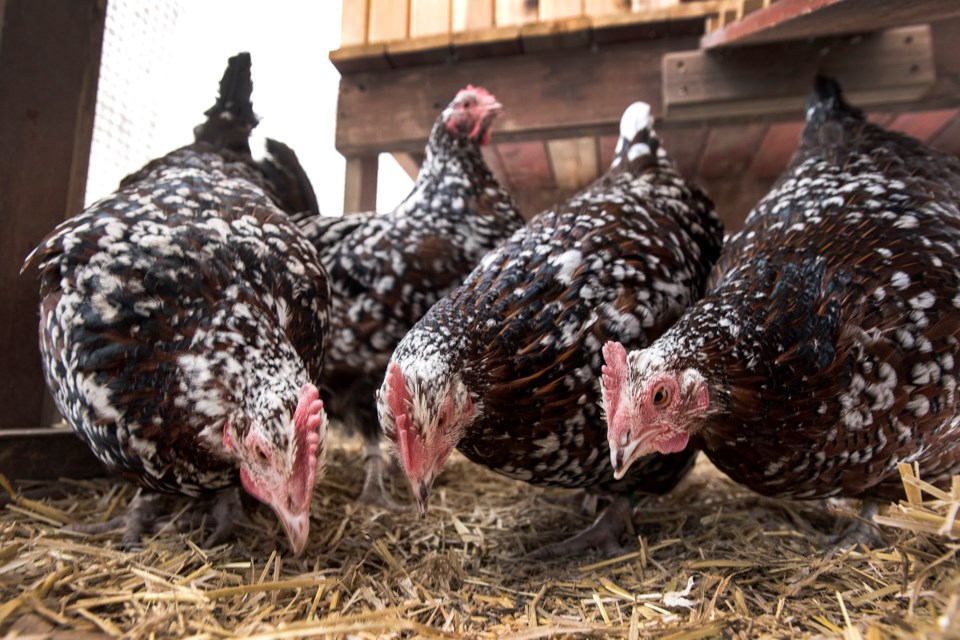Everything was set. The course had been taken, the licence was issued, and the coop was ready to be built, but Lindsay Burnham was missing one key component – the chickens.
Burnham moved to Alberta from Ontario looking for the farm lifestyle. Her family settled in St. Albert and she closely followed the backyard chicken program as it went from a pilot project to a reality in 2019. This year, she decided to get a licence for herself, but there’s been a hitch.
“I’m not looking at having chickens in my possession until late summer.” Burnham said.
Both urban and rural chicken farming have been steadily gaining popularity over the years in municipalities across the province. This year, that interest has taken a sharp upward turn.
Jenna Bartman of PrairieTree Manor, a small farm and hatchery outside of Westlock, said the increase in demand for chickens this year has been “like no other.” She is sold out of everything and has a waitlist for chicks and pullets, but she also says the increase in interest in chickens has been particularly noticeable on social media.
She believes the increased interest is partially due to panic and not wanting to go out and shop, and partially due to people being at home with time on their hands.
“It’s kind of a joke right now for people who have been a part of the chicken forums for a long time,” said Bartman. “All of a sudden, they see all these new chicken owners coming out. The numbers have almost doubled on the Alberta and (Alberta Chickens) ECT Facebook groups.”
River City Chickens is an informal group of volunteers that offers information and classes about keeping hens in an urban environment. The group has been promoting urban hens in Edmonton since 2010.
Laura Klassen-Russell, a volunteer with the organization, said the group offers courses based on demand, which has risen this year.
“We’ve had more interest in classes this year. Last year, we taught about 175 people,” said Klassen-Russell. “And so far this year (we’ve taught) 270, give or take a few. And we have requests for another class.”
Klassen-Russel said there has been a shift in the general interest toward urban hen-keeping.
“We held informal classes about backyard hens before the city was considering allowing them, and we would often get people asking, ‘Well, why would you want backyard hens?’ That was the most common question, and then we reached a stage where nobody was asking that anymore. It was always, ‘How can you have backyard hens?’ So, there’s been a general trend towards increased interest in backyard hens.”
Edmonton removed the cap on the number of licences in May 2019. However, the city is not processing licence requests at this point in time, due to the current health crisis.
The City of St Albert, however, is processing licences electronically. In an emailed statement, Tracy Tsui, from the city's planning and development department, said St. Albert has seen an increase of seven hen licence applications since the beginning of the pandemic. The city has approved 18 licences in total.
Urban chicken bylaws require hens to be 16 weeks in age, to ensure the chickens are indeed hens and not roosters (which aren't allowed in urban settings). Burnham thinks this has made her search more difficult.
“What I am finding is: the farmers are not keeping them until they’re four months old. In fact, they’re selling them out as they’re hatching eggs. I couldn’t get anything that was old enough for the bylaw,” Burnham said. “Even purchasing eggs that you would hatch at your property, there’s a waitlist for those.”
Burnham said she could have potentially found chickens on sites like Kijiji, but she didn’t want to take her chances and they definitely would not have been the breeds that she is interested in. The type of breed is important, especially in an urban setting, since some breeds are not made for a coop environment, some are better with children and some are easier to take care of and are less prone to issues, Bartman explained.
“As people get more into the chicken program, especially in Edmonton and St. Albert, I’m hoping there will be a little bit more of an education on breeds because not all breeds are considered equal with temperament and how they interact. It’s huge.”
Burnham will be trying out a couple different breeds when she gets her chickens later this summer, to find out what works best for her family.
“I think what pushed it harder for me now, is the fact that I’m working from home right now, my kids are home doing virtual school and I thought, this is a great educational opportunity,” Burnham said.
“I just think it’s neat to be able to have your own eggs if you want them, but I just wanted that farm lifestyle, and this is probably as close as I’m getting right now.”
Read more from StAlbertToday.ca



